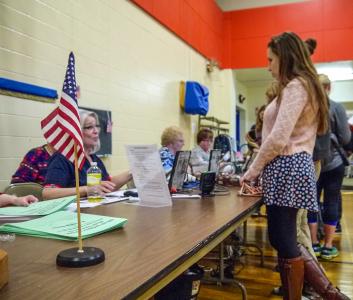Poweshiek County voted Republicans into office for eight out of the 13 partisan positions on the ballot in the midterm elections this Tuesday, Nov. 4.
With 26 percent registered Democrats, 20 percent registered Republicans, 31 percent registered “no party” and 0.002 percent registered “other,” the county largely followed the Republican trend that characterized elections across the country.

Photo by Leina’ala Voss.
Poweshiek County voted two representatives into the county Board of Supervisors, incumbents Trevor White and former manager of the Spencer Grill Larry Wilson, both Republicans. White and Wilson both received about 27 percent of the vote, beating out Democrats Eldon Snook and Jason Roudabush, who each received about 23 percent of the vote.
According to White, his biggest priority is to “make sure we’re fiscally sound on our budget.” The county may need to run on a tighter budget next term due to a decrease in revenue from property taxes. This is partly due to Iowa’s large changes in the ways that property taxes are levied to the state; the state is now taxing multifamily housing units as residential properties rather than commercial properties at full value.
“[These changes] will see a reduction to pretty close to half the amount of property taxes an apartment complex would pay,” Wilson said. “And also commercial property will see a reduction of close to half of the property tax it paid.”
Wilson also added that next term’s budget “is probably going to be the biggest budget challenge for the county in probably the past 15 to 20 years.”
In the event that the board will need to make budget cuts to its countywide $16 million budget, White outlined three possible ways the county can stay fiscally sound: increasing revenue by increasing the valuation in the county, cutting departmental budgets and raising taxes, though White is staunchly against raising taxes.
“Valuation is what properties are worth. If we bring in new businesses, new housing, basically new population, it will increase revenue in the county through expanding businesses, expanding housing, and all that stuff,” White said.
The county also re-elected incumbent County Attorney, Democrat and Grinnell College alum Rebecca Petig ’97. Petig ran against fellow Grinnell alum, Republican Clinton Follette ’11 in a narrow race of 50.7 percent to 49.2 percent. Petig won by 110 votes.
Petig’s term projects include “trying to improve access to the mental health system for citizens of Poweshiek County and dealing with the issue of synthetic substances and their abuse.”
Poweshiek County also re-elected incumbents Sandy Ross and Dianna Longhenry for County Treasurer and County Recorder, respectively. Both women ran unopposed.
For Ross, this election was her first election to a four-year term. She had previously come into office in March of 2013 after the previous County Treasurer retired mid-term. She has helped Grinnell College students with services, such as renewing their driver’s licenses, by creating special days to help cut wait times for students.
“I’ve been working with the College for over a year trying to figure out how to better serve the students,” Ross said. “[These special days have] alleviated some of the wait time on Wednesdays for the general public and it allows students to … be waited on a lot more efficiently.”
Longhenry will also be continuing her work in public record keeping, but has long-term plans to work on preserving the county’s old records from centuries ago.
“We have records dating back to the 1800s. As time goes by, some of these get in bad repair, so I will continue to try to get some of those preserved,” she said.
Dave Maxwell, incumbent Republican member of the Iowa House of Representatives representing District 76, was re-elected, accounting for 54.2 percent of Poweshiek County’s votes, as opposed to Democratic candidate Eric Pederson’s 45.6 percent.
Maxwell stated that his biggest priority in office is to get a state “budget passed in the 110 days that we have to do it.”

Federal and Statewide Elections
Iowa’s senate elections were closely watched by the media due to the close race between Republican Joni Ernst and Democrat Bruce Braley. Ernst ended up winning with 52.7 percent of the vote while Braley had 43.7 percent.
Poweshiek voted for Ernst as well, by a closer margin than the state as a whole. Ernst won 49.6 percent of the vote in the county and Braley won 46 percent, a difference of 266 votes.
Ernst, the first woman to represent Iowa in the United States Congress, has stated that her first priority in the Senate is to repeal Obamacare. Her policy positions include a balanced budget, free-market health care, an opposition to a federal minimum wage and an opposition to same-sex marriage. She will succeed to the seat held by retiring senator Tom Harkin, a Democrat.
Rod Blum, a Republican Dubuque businessman, was elected as the U.S. congressman for District 1, the seat vacated by Braley. Blum defeated Democrat Pat Murphy in a tight race, winning 51.2 percent of the vote to Murphy’s 48.7. Poweshiek County broke roughly the same way as the district.
Blum’s political efforts are geared towards the economy. He supports repealing Obamacare, lowering taxes on American businesses and freezing all spending by the federal government until a budget surplus is achieved.
Voters across the state and in Poweshiek County both preferred incumbent Governor Terry Branstad, who won by a 22 percent margin statewide and a 15 percent margin countywide.
Branstad, a Republican now serving his sixth term, is the longest-serving governor in United States history. He has campaigned under the proposals for a commercial property tax cut that he argues will reduce tax bills by more than $4 billion and more educational funding for teachers grades K-12.
Republican Paul Pate won as Secretary of State, narrowly beating out Democratic competitor Brad Anderson by less than two percentage points. Conversely, Anderson won Poweshiek County by four points.
Pate, who served as Iowa’s Secretary of State from 1995 to 1999, favors a state law requiring eligible voters to have a state-issued photo ID at the polls. He also proposes that all auditor offices in Iowa should be equipped with software that can verify a signature on an absentee ballot.
Mary Mosiman was re-elected State Auditor for her second term, beating Democrat and Grinnell alum Jon Neiderbach ’78 in statewide and countywide polls.
Aside from continuing necessary state audits, Mosiman will be pursuing fraud awareness and fraud preventative methods as a long-term project. In an email to The S&B, Mosiman commented on how Poweshiek County has traditionally “responded very favorably to any recommendations” done under her watch.
Incumbent Secretary of Agriculture since 2006, Bill Northey, a Republican, was re-elected by a large margin both statewide and countywide. Northey will continue his efforts to encourage farmers to embrace conservation efforts that reduce Iowa’s nitrate-concentrated runoff.
Democrat Tom Miller was re-elected to his ninth fourth-year term as Attorney General, making him the longest continuously-serving state attorney general in the nation. Miller won by a large margin, winning by 24 points in Poweshiek County and by 12 points statewide.
Miller will continue his efforts in protecting consumers from predatory buying clubs and limiting the aggressive tactics from for-profit colleges.
Incumbent State Treasurer Michael Fitzgerald was also easily re-elected. Fitzgerald has held office as treasurer since 1983 and understands that he is one of the few Democrats elected this year. Nonetheless he is ready to work alongside Republicans, especially Mosiman, whom he works closely with to look at state funds.
“In the past I’ve worked with Republican auditors to bring in generally accepted accounting principles … Iowa has a little better attitude than the nation and the national government as far as Republicans and Democrats working together. But I must admit, it’s getting harder,” Fitzgerald said.
During his new term, Fitzgerald will continue to improve programs such as College Savings Iowa, a tax-advantaged program that has invested over $3 billion from college savings accounts. Fitzgerald is using his new term to push for more low-income families to be using College Savings Iowa.
“We have the best college savings program in the country. But I want to make sure even low-income people participate more in college savings,” Fitzgerald said.
All of the partisan positions hold a four-year term, except for House of Representative politicians, who hold two-year terms, and senators, who hold six-year terms.
























































